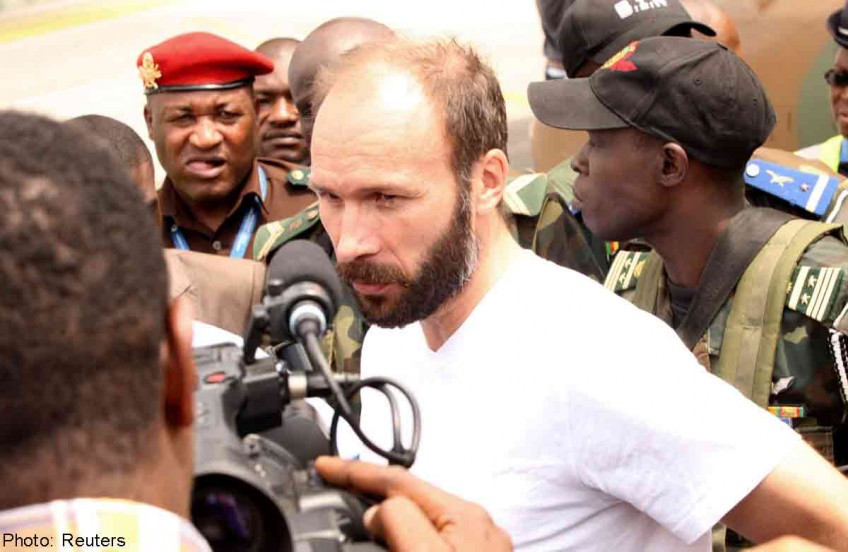French priest kidnapped in Cameroon back home

PARIS - A French Catholic priest abducted in Cameroon by Islamic militants arrived home Wednesday after a seven-week ordeal he described as a time of "terrible boredom, sadness and anger".
The circumstances of Georges Vandenbeusch's release are unclear, but both France - often accused of paying ransoms for hostages despite stiff government denials - and his captors Boko Haram have denied that a ransom was paid.
The 42-year-old, who was freed on Tuesday, touched down at Villacoublay military air base near Paris where President Francois Hollande greeted him and hailed his "courage" and "self-sacrifice".
He had been kidnapped on November 13 by heavily armed men who burst into his parish at night in the far north of the central African country and reportedly took him to neighbouring Nigeria.
The radical Islamist movement Boko Haram, which has killed thousands of people in attacks against Christians and government targets in northern Nigeria, claimed responsibility for holding him soon after he was kidnapped.
A source within the Islamist group told AFP Wednesday they had asked Paris for money through the Cameroon government, but that France refused and requested Vandenbeusch be released on humanitarian grounds because of his status as a clergyman.
"The leadership (of Boko Haram) decided to release the priest on compassionate grounds and having benefited from his medical expertise," the source told AFP.
"The priest offered medical service to sick members during his period of captivity. The leadership felt there was no longer need for keeping him."
But in an interview to France 2 television, the priest denied treating any militants.
"I am not a nurse nor a doctor. Had they brought me someone who is bleeding, I would have done what I could, but they didn't. They have compassion for no-one," he said.
A Cameroonian security source told AFP that an unidentified Boko Haram leader detained in Cameroon had been freed in return for the release of the priest.
French Foreign Minister Laurent Fabius, who flew to the Cameroonian capital Yaounde to bring back Vandenbeusch, said negotiations with the captors had been focused "mainly on judicial aspects".
Kept 'under a tree'
Speaking in Yaounde before he boarded his flight back to France, Vandenbeusch said he had not been mistreated by his captors despite being kept in "rustic conditions".
He expressed "great joy" at returning home but said people should remember those who are still being held hostage.
Vandenbeusch described his time in captivity as a period of "terrible boredom, sadness and anger because I'm very fond of the parish where I worked" in Cameroon.
"I was under a tree for a month and a half," he said, explaining that his two main guards spoke a local language and not English, he did not have anything to read, or a radio to listen to.
On Wednesday morning, Hollande warned other Frenchmen and women in high-risk areas to take care and avoid putting themselves in danger's way. He said this applied not only to "priests who have a mission to accomplish" but to other French nationals.
France needed to be "rigorous" not to allow other hostages to be taken, added Hollande.
Vandenbeusch told French television he was convinced he had been targeted merely as a Westerner.
"They didn't even know I was French. It wasn't a case of hostility towards Christians or the French in particular," he said.
The Vatican earlier welcomed the priest's release and called on the faithful to pray for those still being held around the world.
In his former parish of Sceaux, near Paris, the faithful expressed joy at his release.
"This church prayed for him a lot. Every day, candles were lit. You had to believe in it," said Marie, a 45-year-old worshipper.
In a statement, his family thanked French, Cameroonian and Nigerian authorities and all those who supported them during the ordeal.
"At this time of joy, we do not forget the other French hostages, and are thinking of their families," they said Tuesday.
There are still six French people being held hostage in Mali and Syria. Vandenbeusch was abducted from his home near the town of Koza in northern Cameroon, about 30 kilometres (20 miles) from the Nigerian border.
He was seized by about 15 people who had first gone to the nuns' house, apparently to look for money, giving him time to warn the embassy.
The priest had been advised not to stay on in an area designated as a dangerous zone prone to militancy and kidnappings.
In February, a Frenchman employed by gas group Suez was kidnapped in the same area together with his wife, their four children and his brother while visiting a national park.
They were taken to neighbouring Nigeria and also held by Boko Haram, before being released in April.